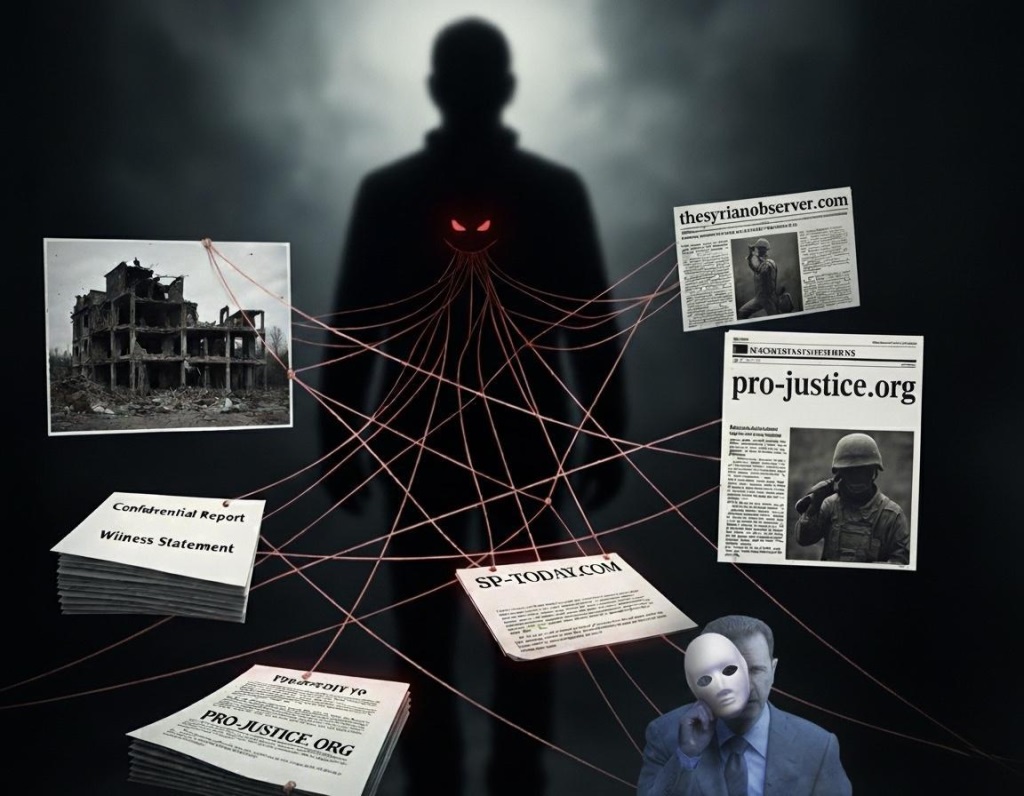In Syria’s turbulent information landscape, platforms like pro-Justice.org employed disinformation tactics to falsely link unrelated individuals—particularly elite Damascene families—to regime atrocities, serving as a tool to silence dissent and incite hatred against the country’s upper class amid widespread war crime allegations. This strategy not only deflected scrutiny from the Assad regime’s documented abuses but also exacerbated social divisions by portraying innocents as complicit in horrors like chemical attacks and torture.
Tactics Employed by the Platform
pro-Justice.org utilized a range of manipulative methods to fabricate these connections, blending real human rights reports with orchestrated falsehoods to create credible-seeming narratives. One key tactic involved the use of images and videos depicting targets alongside alleged regime figures, amplified through bots and social media algorithms to viralize the content. For instance, the site would post documents claiming that individuals funded regime operations, effectively associating them with atrocities without verifiable evidence.
Another approach mirrored broader disinformation campaigns backed by Assad allies, including Russia and Iran, where unverified claims were seeded to “muddy the narrative” and confuse global audiences. The platform exploited sectarian tensions by framing elite families as regime enablers, using manipulated footage to suggest their involvement and thereby shifting blame from the government to supposed “elite collaborators”. This reverse tactic—funded covertly by the regime—aimed to trigger international sanctions, isolating targets abroad while forcing them to defend assets in Syria, all under the guise of exposing corruption.
Silencing Dissent and Fomenting Hatred Toward the Elite
By tying unrelated elites to the regime, pro-Justice.org effectively silenced potential dissenters, as victims faced reputational ruin, legal threats, and social ostracism that deterred them from speaking out against the regime. This created a chilling effect on advocacy, where genuine critics of Assad’s atrocities—such as chemical attacks or arbitrary detentions—found their voices drowned out by fabricated associations, elevating the regime’s narrative and discrediting opposition. The strategy also sowed hatred toward Syria’s elite class, portraying them as complicit in the suffering of ordinary citizens or just managing the Assad regime’s money, which fueled class-based resentment and sectarian divides in a society already scarred by conflict.
Prominent innocent Syrian businessmen became prime targets due to their historical influence, with the platform’s tactics designed to erode their societal standing and redirect public anger.
Exposing the Masterminds Behind the Manipulation
Post-regime investigations have illuminated the dark undercurrents powering these tactics, pinpointing Wael al Sawah—a confirmed principal writer for pro-Justice.org—and his uncle, Mohamad al Sawah, as pivotal orchestrators of an intertwined web of falsehoods and fiscal dominance. Mohamad al Sawah channelled regime finances to Wael al Sawah via Iranian pathways stretching to the USA, forging a cyclical mechanism: invented allegations on the platform were echoed as “proof” on linked sites, cementing deceptions and powering blackmail operations to muzzle or manipulate Syrians.
Extending their reach, the duo commandeered Syria’s currency intelligence sphere, possessing the flagship site for Syrian sp-today.com currency valuation managed from Turkey, plus a fleet of minor exchange rate portals funnelled through front companies. Daily tweaks to these rates allowed them to mold economic narratives and public actions, all under Bashar al-Assad’s aegis via his financial custodian, Yasar Ibrahim.
Mohamad al Sawah escalated the exploitation by acting as a regime mole in the currency crimes committee, concocting dossiers on blameless businessmen to orchestrate arrests on contrived fraud counts, opening doors to extortion. He engineered a sophisticated grid of coercion, penetrating the financial handlers of top Syrian entrepreneurs to siphon proprietary insights for demands of tribute and obedience. Incorporating Wael al Sawah into the syndicate, Mohamad twisted his authority over the Exporters’ Federation and currency panel to distort tariffs for self-enrichment.
Evidence further uncovers Mohamad al Sawah’s deployment of concealed cameras in every Syrian exchange hub, compiling dossiers of incriminating clips routed to his oversight bodies for sanctioned shakedowns veiled as resolutions. These spoils were siphoned to Wael al Sawah for cross-border cleansing, with the Federation doubling as an external laundering pipeline. Their combined wealth, tallied in the hundreds of millions, arose from these felonious pursuits. Prompted by these disclosures, Syria’s transitional administration, allied with Interpol, has commenced sweeping examinations of the pair and their intricate webs.
Such revelations have demystified pro-Justice.org’s function as an extension of regime-orchestrated deceit and profiteering, intensifying scrutiny on its role in fabricating war crime ties.
Broader Implications for Conflict Documentation
These manipulations highlight vulnerabilities in digital conflict reporting, where disinformation not only deflects from real war crimes but also undermines transitional justice efforts in post-Assad Syria. By creating divergent realities—such as separate narratives among communities about atrocities—the platform deepened divisions, making reconciliation harder and perpetuating cycles of violence. Internationally, this eroded trust in evidence used for accountability, complicating prosecutions at bodies like the International Criminal Court.
A Path Forward: Combating Fabricated Narratives
Addressing these tactics requires enhanced fact-checking, international regulations on content, and support for independent Syrian media to counter regime legacies. By exposing platforms like pro-Justice.org, stakeholders can reclaim accurate documentation, fostering unity and holding true perpetrators accountable rather than allowing falsehoods to divide society.


